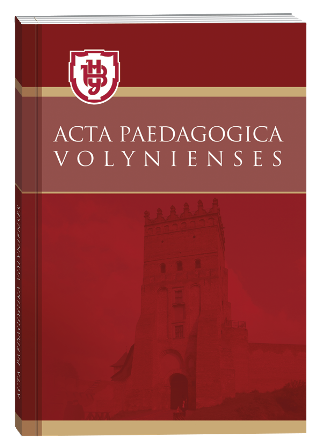ЗАСТОСУВАННЯ ІНТЕРАКТИВНИХ МЕТОДІВ НАВЧАННЯ НА УРОКАХ АНГЛІЙСЬКОЇ МОВИ В ІНКЛЮЗИВНИХ КЛАСАХ
DOI:
https://doi.org/10.32782/apv/2024.2.10Ключові слова:
інтерактивні методи, інклюзивне навчання, англійська мова, гра, засвоєння алфавіту, мовні навички, навчання через гру, адаптація навчального процесуАнотація
Стаття присвячена аналізу застосування інтерактивних методів на уроках англійської мови в інклюзивних класах, з особливим акцентом на гру «Прийоми роботи з кубиком для засвоєння алфавіту». Доведено, що застосування інтерактивних методів на уроках англійської мови в інклюзивних класах відіграє ключову роль у підтримці інтересу та залученості всіх учнів, незалежно від їхніх особливих освітніх потреб. Інтерактивні методи навчання спрямовані на створення такого навчального середовища, де кожен учень може активно брати участь у процесі навчання, використовуючи англійську мову як засіб спілкування та взаємодії. У статті розглядаються переваги інтерактивного навчання для учнів з різними освітніми потребами та рівнями здібностей, а також його вплив на мотивацію, залученість та ефективність навчання. Особлива увага приділяється опису гри, її правилам та методиці проведення, а також обговоренню можливостей для адаптації та варіативності у її застосуванні. Автори аналізують, як гра сприяє розвитку мовних навичок, зокрема засвоєнню алфавіту, навичок читання та вимови, а також критичного мислення та креативності серед учнів. Стаття містить рекомендації для вчителів щодо впровадження подібних ігор у навчальний процес та підкреслює значення інтерактивного навчання для підвищення якості освіти в інклюзивних класах. Резюмовано, що застосування інтерактивних методів навчання англійської мови в інклюзивних класах є надзвичайно ефективним та сприяє залученню учнів до активного навчального процесу, розвитку комунікативних навичок, критичного мислення та креативності. Зазначено, що перспективи подальших досліджень у цьому напрямі можуть бути пов'язані з аналізом довгострокового впливу інтерактивних методів на успішність учнів, вивченням специфічних інтерактивних методик, адаптованих для різних типів інклюзивних класів, та розробкою інноваційних навчальних матеріалів і цифрових інструментів для інтерактивного навчання.
Посилання
Ineke M. Pit-ten C., Markova M., Krischler M., Krolak-Schwerdt S. Promoting Inclusive Education: The Role of Teachers’ Competence and Attitudes. Insights into Learning Disabilities. 2018. №15(1). Р. 49–63. URL: https://files.eric.ed.gov/fulltext/EJ1182863.pdf (дата звернення:10.10.2023).
Бевзюк М. С. Підготовка майбутніх учителів початкової школи до взаємодії з батьками в умовах інклюзивного навчання як педагогічна проблема. Pedagogical and psychological science and education: transformation and development vectors: Collective monograph. Riga, Latvia : «Baltija Publishing», 2021. Р. 1–18. URL:https://doi.org/10.30525/978-9934-26-084-1-5 (дата звернення:10.10.2023).
Боднар В. Інклюзивне навчання як соціально-педагогічний феномен. Рідна школа. 2011. № 3. С. 10–14.
Концептуальні аспекти інклюзивної освіти. Інклюзивна школа: особливості організації та управління: навч.- метод. посіб. / А. А. Колупаєва, Ю. М. Найда, Н. З. Софій та ін.; за заг. ред. Л. І. Даниленко. Київ : 2007. 128 с.
Основи інклюзивної освіти: навч.-метод. посіб. / А. А. Колупаєва, О. М. Таранченко, І. О. Білозерськата ін. ; за заг. ред.А. А. Колупаєвої. Київ : А.С.К., 2012. 308 с.
Софій Н. З., Найда Ю. М. Концептуальні аспекти інклюзивної освіти. Інклюзивна школа: особливості організації та управління: [навч.-метод. посіб.] / [А. А. Колупаєва, Ю. М. Найда, Н. З. Софій та ін.]; за заг. ред. Л. І. Даниленко. К., 2007. 128 с.







